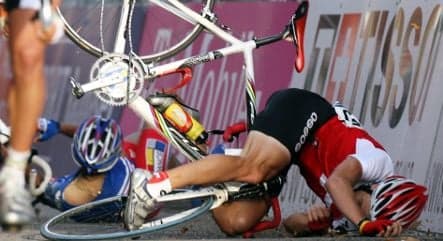Doping scandals wreck German cycling

The German cycling world suffered two major shake-ups on Thursday when public television broadcaster ARD cancelled coverage of the Tour de France next summer and the German Cycling Federation (BDR) called off the Tour of Germany entirely.
ARD had already pulled out of Tour de France coverage midway through the sporting event in 2007 after German rider Patrick Sinkewitz tested positive for testosterone. The broadcaster had planned to renegotiate their contract with Tour organizers, but decided instead to quit their coverage altogether in the wake of new incidents of doping.
“The athletic value of the Tour de France has been greatly reduced by the cumulative doping findings,” said ARD director Fritz Raff. “Thus the programming value has also been reduced.”
ARD traditionally shares coverage of the event with another German public channel, ZDF. But ARD’s decision forced ZDF to cancel their plans to cover the event too.
In another crushing blow to a sport already struggling because of its tarnished image, the German Cycling Federation (BDR) cancelled the 2009 Tour of Germany shortly after ARD’s announcement.
“We regret this decision, but it had to be taken,” tour organizer Kai Rapp told news agency DPA from Hamburg.
“Without TV presence it is difficult reel in any sponsors,” the tour’s press spokesperson Hendrik Heinz said. “One has to consider the entire product. If ARD and ZDF no longer do live coverage of the Tour de France, it won’t be any different with the German tour. One effects the other.”
It remains unclear whether the BDR will attempt to organize another tour in 2010.
Thursday’s events were set in motion on Monday when cycling team Gerolsteiner announced it would withdraw from all racing after Austrian rider Bernhard Kohl failed a drugs test. He was the second Gerolsteiner rider to test positive for the new generation of banned blood booster EPO (erythropoietin) known as CERA. The 26-year-old said he’d taken the drug to aid his recovery after a fall in an earlier race.
Other cycling teams like German dairy company Milram may the next also be considering their exit strategies, news agency AFP reported.
Comments
See Also
ARD had already pulled out of Tour de France coverage midway through the sporting event in 2007 after German rider Patrick Sinkewitz tested positive for testosterone. The broadcaster had planned to renegotiate their contract with Tour organizers, but decided instead to quit their coverage altogether in the wake of new incidents of doping.
“The athletic value of the Tour de France has been greatly reduced by the cumulative doping findings,” said ARD director Fritz Raff. “Thus the programming value has also been reduced.”
ARD traditionally shares coverage of the event with another German public channel, ZDF. But ARD’s decision forced ZDF to cancel their plans to cover the event too.
In another crushing blow to a sport already struggling because of its tarnished image, the German Cycling Federation (BDR) cancelled the 2009 Tour of Germany shortly after ARD’s announcement.
“We regret this decision, but it had to be taken,” tour organizer Kai Rapp told news agency DPA from Hamburg.
“Without TV presence it is difficult reel in any sponsors,” the tour’s press spokesperson Hendrik Heinz said. “One has to consider the entire product. If ARD and ZDF no longer do live coverage of the Tour de France, it won’t be any different with the German tour. One effects the other.”
It remains unclear whether the BDR will attempt to organize another tour in 2010.
Thursday’s events were set in motion on Monday when cycling team Gerolsteiner announced it would withdraw from all racing after Austrian rider Bernhard Kohl failed a drugs test. He was the second Gerolsteiner rider to test positive for the new generation of banned blood booster EPO (erythropoietin) known as CERA. The 26-year-old said he’d taken the drug to aid his recovery after a fall in an earlier race.
Other cycling teams like German dairy company Milram may the next also be considering their exit strategies, news agency AFP reported.
Join the conversation in our comments section below. Share your own views and experience and if you have a question or suggestion for our journalists then email us at [email protected].
Please keep comments civil, constructive and on topic – and make sure to read our terms of use before getting involved.
Please log in here to leave a comment.